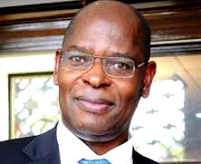NAIROBI, (Reuters) – Kenya is losing a third of its state budget – the equivalent of about $6 billion – to corruption every year, the country’s new anti-graft chief told Reuters, saying his agency was badly short of staff and modern equipment to tackle the problem.

Philip Kinisu, a retired auditor, said in an interview that he wanted to build on Kenyans’ discontent with corruption but the real drive to stamp it out had to come from public pressure for change.
While the finance minister disputed Kinisu’s estimate of the losses, blaming instead poor paperwork, President Uhuru Kenyatta has acknowledged corruption has reached levels that threaten national security.
Kenya has a history of multi-million dollar scandals that have failed to result in high-profile convictions. This has angered the public, who accuse top officials of acting with impunity and encouraging graft by those in lower posts.
Businesses also often cite pervasive corruption as one of the biggest obstacles to investment.
Kinisu, who became chairman of the Ethics and Anti-Corruption Commission (EACC) in January, noted that the total state budget was close to the equivalent of $20 billion.
“Kenya’s budget is now approaching 2 trillion shillings; a third of it is being wasted through corruption,” said Kinisu, whose predecessor resigned last year.
Were such a sum not lost, it would be enough to cover most day-to-day state spending before investment items such as development projects.
“Six hundred billion shillings can finance the bulk of the government’s recurrent expenditure so that the services can reach all corners of the republic,” said Kinisu, who retired from international accountancy and advisory firm PwC in 2014 after a three-decade career.
Finance Minister Henry Rotich denied that so much was being lost to corruption but said poor documentation at times fuelled the perception that funds were being squandered.
“It is not that the money is lost, it is probably the documentation is not provided on time,” the minister told Reuters on the sidelines of a loan deal signing at the Treasury.
Faced with a growing public outcry last year, Kenyatta promised to root corruption out of the government. Five ministers stepped aside in 2015 after they faced corruption investigations and then lost their jobs in a reshuffle. Two former ministers now face trial proceedings.
Kinisu, who rose at PwC from junior auditor to regional chief executive and senior partner, said he was undeterred by any hazards of the job even after a shot was fired into his private office last month. No one was hurt and the case is being investigated.
“This is an institution that needs to be supported …, an institution that we need to work through in order to improve our country,” he said in the interview, conducted on Tuesday. “I will continue doing what I’m doing.”
The EACC is an independent state-funded institution, whose head is nominated by the president and vetted by parliament. Former chairman Mumo Matemu had faced allegations of incompetence. Matemu denied this but said he was resigning for the sake of the campaign against corruption.
The EACC’s annual budget stands at about 2.6 billion shillings, which Kinisu said was two and half times the level it was two years ago.
But he said the agency had just a third of the personnel it needed and had to struggle with outdated equipment to store and analyse data or evidence. “The world has gone high tech and we are not anywhere near where we need to be,” he added.
All EACC staff were being vetted to ensure their lifestyle was in line with their earnings, a task that will be completed in the third quarter of 2016.
More than 300 corruption cases are being prosecuted in court, still a small fraction of the 55,000 cases reported to the commission in recent years.
Kinisu said these figures indicated the scale of the task ahead. “The fight against corruption is not a sprint,” he said.
The EACC would work with other agencies such as the office of the auditor general and the budget controller, he said. But Kenyans had to demand change and rid themselves of any ambiguous cultural attitudes under which some have a sneaking admiration for the trappings of graft.
“I am encouraged by the level of public awareness,” he said. “We have to build on that and get the public to genuinely reject corruption, genuinely reject those who practise it and stop admiring the gains of corruption.”





